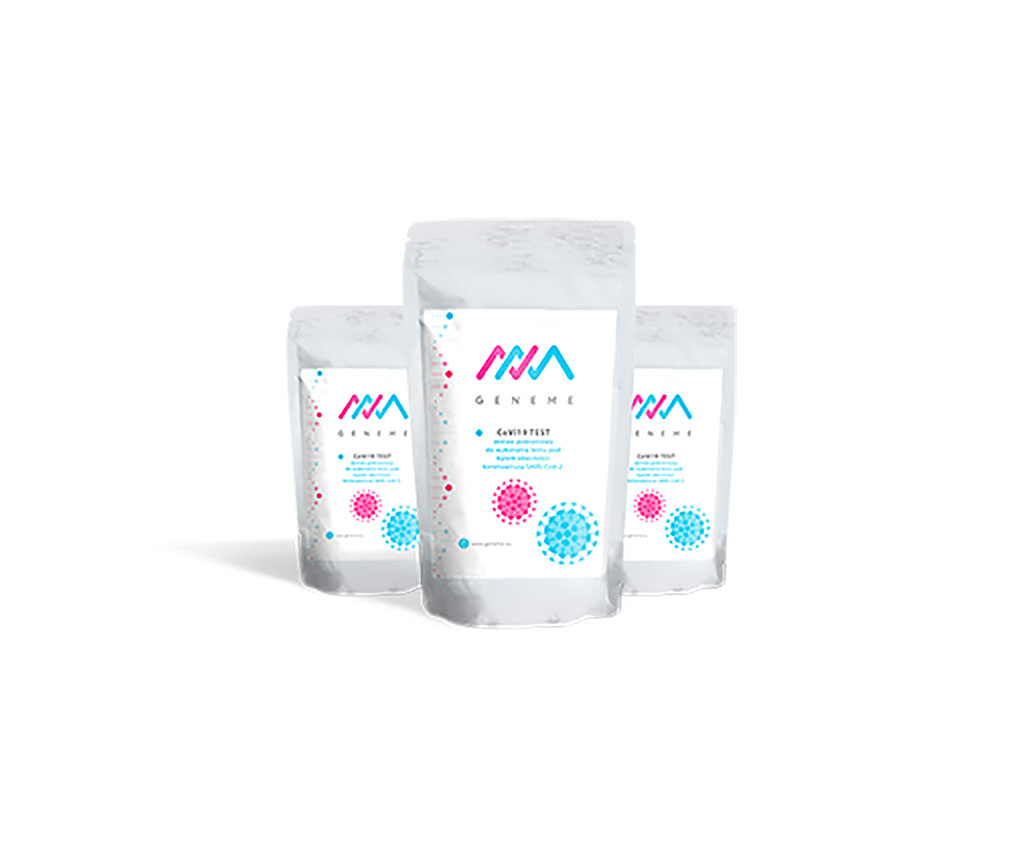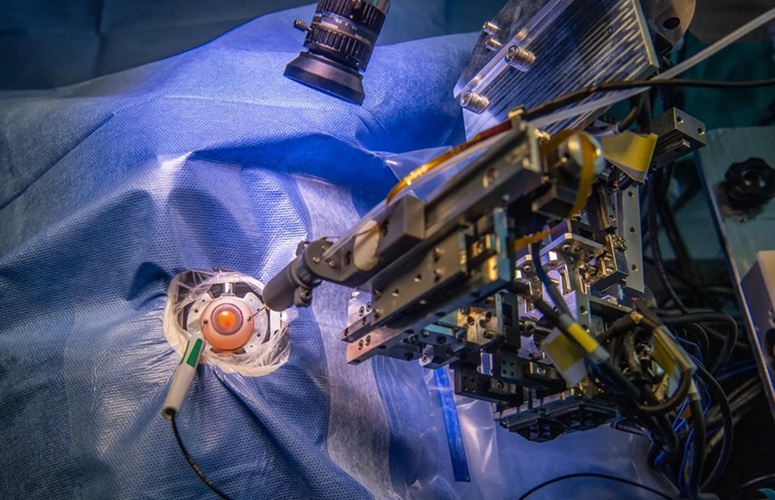New COVID-19 Mouth Swab Test Can Be Completed On-Premises in 13-25 Minutes Without Laboratory Involvement
|
By HospiMedica International staff writers Posted on 18 May 2020 |

Image: New COVID-19 Mouth Swab Test (Photo courtesy of GeneMe)
GeneMe (Gdańsk, Poland) has developed FRANKD, a fast, scalable and reliable mouth swab test for COVID-19 that is completed on-premises in on average 13-25 minutes with no laboratory involvement.
FRANKD requires less time to produce a result than the gold-standard RT-PCR (Reverse Transcriptase Polymerase Chain Reaction) reference test recommended by the World Health Organization. The test uses a patented enzyme rather than the currently scarce reagents used in RT-PCR tests to rapidly produce a definitive and reliable result. The use of a portable machine analyzer to amplify the virus within the sample ensures high test accuracy. Additionally, testing on-premises by trained staff removes delays and the challenge of getting test samples to lab technicians to process.
Individuals use the secure, free Yoti digital ID app to link themselves to their test. With consent, the digital test result is automatically added into the tested person’s Yoti. Individuals can present or share their tamperproof, verified details with other parties in seconds - including their test result - whether in person or online, with a tap of a button or scan of a QR code.
The test has been independently validated with 100% sensitivity and 100% specificity by the Gdańsk University of Technology and European CE regulatory certification is expected by early June. FRANKD is currently in talks with governments and businesses across Europe to roll out millions of tests over the coming months, enabling key industries to test hundreds of thousands of employees daily, to help understand the spread of the virus and to monitor the infection R factor more accurately. FRANKD is scalable with five million monthly tests expected from August. During June and July, FRANKD tests will be processed using hundreds of existing analyzer machines that are able to handle 90 tests every 30 minutes, although GeneMe expects affordable bespoke machines to be available from August.
“We are extremely pleased with the quality of the FRANKD test and the contribution it will make towards the fight against the coronavirus pandemic and its damaging effects on public health and society,” said Dawid Nidzworski Founder and CEO of GeneMe and developer of FRANKD.
Related Links:
GeneMe
FRANKD requires less time to produce a result than the gold-standard RT-PCR (Reverse Transcriptase Polymerase Chain Reaction) reference test recommended by the World Health Organization. The test uses a patented enzyme rather than the currently scarce reagents used in RT-PCR tests to rapidly produce a definitive and reliable result. The use of a portable machine analyzer to amplify the virus within the sample ensures high test accuracy. Additionally, testing on-premises by trained staff removes delays and the challenge of getting test samples to lab technicians to process.
Individuals use the secure, free Yoti digital ID app to link themselves to their test. With consent, the digital test result is automatically added into the tested person’s Yoti. Individuals can present or share their tamperproof, verified details with other parties in seconds - including their test result - whether in person or online, with a tap of a button or scan of a QR code.
The test has been independently validated with 100% sensitivity and 100% specificity by the Gdańsk University of Technology and European CE regulatory certification is expected by early June. FRANKD is currently in talks with governments and businesses across Europe to roll out millions of tests over the coming months, enabling key industries to test hundreds of thousands of employees daily, to help understand the spread of the virus and to monitor the infection R factor more accurately. FRANKD is scalable with five million monthly tests expected from August. During June and July, FRANKD tests will be processed using hundreds of existing analyzer machines that are able to handle 90 tests every 30 minutes, although GeneMe expects affordable bespoke machines to be available from August.
“We are extremely pleased with the quality of the FRANKD test and the contribution it will make towards the fight against the coronavirus pandemic and its damaging effects on public health and society,” said Dawid Nidzworski Founder and CEO of GeneMe and developer of FRANKD.
Related Links:
GeneMe
Latest COVID-19 News
- Low-Cost System Detects SARS-CoV-2 Virus in Hospital Air Using High-Tech Bubbles
- World's First Inhalable COVID-19 Vaccine Approved in China
- COVID-19 Vaccine Patch Fights SARS-CoV-2 Variants Better than Needles
- Blood Viscosity Testing Can Predict Risk of Death in Hospitalized COVID-19 Patients
- ‘Covid Computer’ Uses AI to Detect COVID-19 from Chest CT Scans
- MRI Lung-Imaging Technique Shows Cause of Long-COVID Symptoms
- Chest CT Scans of COVID-19 Patients Could Help Distinguish Between SARS-CoV-2 Variants
- Specialized MRI Detects Lung Abnormalities in Non-Hospitalized Long COVID Patients
- AI Algorithm Identifies Hospitalized Patients at Highest Risk of Dying From COVID-19
- Sweat Sensor Detects Key Biomarkers That Provide Early Warning of COVID-19 and Flu
- Study Assesses Impact of COVID-19 on Ventilation/Perfusion Scintigraphy
- CT Imaging Study Finds Vaccination Reduces Risk of COVID-19 Associated Pulmonary Embolism
- Third Day in Hospital a ‘Tipping Point’ in Severity of COVID-19 Pneumonia
- Longer Interval Between COVID-19 Vaccines Generates Up to Nine Times as Many Antibodies
- AI Model for Monitoring COVID-19 Predicts Mortality Within First 30 Days of Admission
- AI Predicts COVID Prognosis at Near-Expert Level Based Off CT Scans
Channels
Critical Care
view channel
Light-Based Technology to Measure Brain Blood Flow Could Diagnose Stroke and TBI
Monitoring blood flow in the brain is crucial for diagnosing and treating neurological conditions such as stroke, traumatic brain injury (TBI), and vascular dementia. However, current imaging methods like... Read more
AI Heart Attack Risk Assessment Tool Outperforms Existing Methods
For decades, doctors have relied on standardized scoring systems to assess patients with the most common type of heart attack—non-ST-elevation acute coronary syndrome (NSTE-ACS). The GRACE score, used... Read moreSurgical Techniques
view channel
Robotic Assistant Delivers Ultra-Precision Injections with Rapid Setup Times
Age-related macular degeneration (AMD) is a leading cause of blindness worldwide, affecting nearly 200 million people, a figure expected to rise to 280 million by 2040. Current treatment involves doctors... Read more
Minimally Invasive Endoscopic Surgery Improves Severe Stroke Outcomes
Intracerebral hemorrhage, a type of stroke caused by bleeding deep within the brain, remains one of the most challenging neurological emergencies to treat. Accounting for about 15% of all strokes, it carries... Read morePatient Care
view channel
Revolutionary Automatic IV-Line Flushing Device to Enhance Infusion Care
More than 80% of in-hospital patients receive intravenous (IV) therapy. Every dose of IV medicine delivered in a small volume (<250 mL) infusion bag should be followed by subsequent flushing to ensure... Read more
VR Training Tool Combats Contamination of Portable Medical Equipment
Healthcare-associated infections (HAIs) impact one in every 31 patients, cause nearly 100,000 deaths each year, and cost USD 28.4 billion in direct medical expenses. Notably, up to 75% of these infections... Read more
Portable Biosensor Platform to Reduce Hospital-Acquired Infections
Approximately 4 million patients in the European Union acquire healthcare-associated infections (HAIs) or nosocomial infections each year, with around 37,000 deaths directly resulting from these infections,... Read moreFirst-Of-Its-Kind Portable Germicidal Light Technology Disinfects High-Touch Clinical Surfaces in Seconds
Reducing healthcare-acquired infections (HAIs) remains a pressing issue within global healthcare systems. In the United States alone, 1.7 million patients contract HAIs annually, leading to approximately... Read moreHealth IT
view channel
Printable Molecule-Selective Nanoparticles Enable Mass Production of Wearable Biosensors
The future of medicine is likely to focus on the personalization of healthcare—understanding exactly what an individual requires and delivering the appropriate combination of nutrients, metabolites, and... Read moreBusiness
view channel
Philips and Masimo Partner to Advance Patient Monitoring Measurement Technologies
Royal Philips (Amsterdam, Netherlands) and Masimo (Irvine, California, USA) have renewed their multi-year strategic collaboration, combining Philips’ expertise in patient monitoring with Masimo’s noninvasive... Read more
B. Braun Acquires Digital Microsurgery Company True Digital Surgery
The high-end microsurgery market in neurosurgery, spine, and ENT is undergoing a significant transformation. Traditional analog microscopes are giving way to digital exoscopes, which provide improved visualization,... Read more
CMEF 2025 to Promote Holistic and High-Quality Development of Medical and Health Industry
The 92nd China International Medical Equipment Fair (CMEF 2025) Autumn Exhibition is scheduled to be held from September 26 to 29 at the China Import and Export Fair Complex (Canton Fair Complex) in Guangzhou.... Read more










.jpg)






